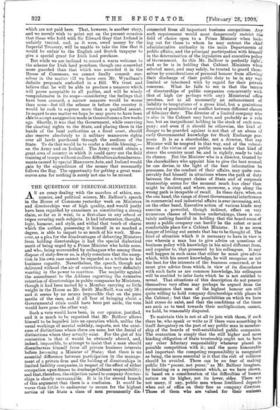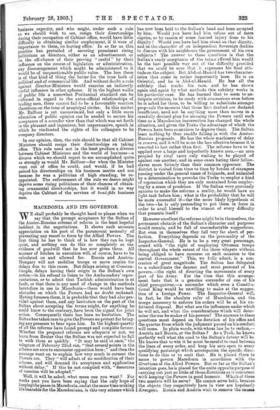THE QUESTION OF DIRECTOR-MINISTERS.
AS an essay dealing with the marches of ethics, eco- nomics, and political science, Mr. Balfour's speech in the House of Commons yesterday week on Ministers and directorships was of high quality, and would justly have been regarded by examiners as constituting a strong claim, so far as it went, to a first-class in any school or tripos covering such subjects. It had information, thought, logic, humour, and style, and withal that touch of charm which the author, possessing it himself in so marked a i degree, is able to impart to so much of his work. More- over, as a plea for the disadvantages of debarring Ministers from holding directorships it had the special dialectical merit of being urged by a Prime Minister who holds none, and who, being surrounded by colleagues who among them dispose of sixty-five or so, is shyly conscious that the excep- tion in his own case cannot be regarded as a tribute to his business capacity. Nevertheless, the speech, though not delivered without the air of conviction, was very definitely wanting in the power to convince. The majority against the , amendment to the Address regretting the extensive retention of directorships in public companies by Ministers, though it bad been moved by a Member carrying as little weight in the House as Mr. Swift MacNeill, was only 38 ; and it seems by no means impossible that on the pure merits of the case, and if all fear of bringing about a Governmental crisis could have been put aside, the vote would have gone the other way.
Such a vote would have been, in our opinion, justified, and it is much to be regretted that Mr. Balfour allows himself to be beguiled into an operation which, unlike the usual workings of mental subtlety, imports, not the exist- ence of distinctions where there are none, but the denial of distinctions where they actually exist. For the gist of his contention is that it would 'be obviously absurd, and, indeed, impossible, to attempt to insist that a man should disembarrass himself from all private business interests before becoming a Minister of State ; that there is no essential difference between participation in the manage- ment of a private firm and the holding of directorships in limited liability companies, in respect of the effect of either occupation upon fitness to discharge Cabinet responsibility; and that,therefore, the objection raised to company director- ships is clearly unreasonable. It is in the second branch of this argument that there is a confusion. It would be worse than futile to endeavour to secure for the highest service of the State a class of men permanently dis- connected from all important business occupations. Any such requirement would most dangerously restrict the field of choice open to a Prime Minister when look- ing out for those to whom he may entrust the chief. administrative authority in the main Departments of public affairs, and the principal participation with himself• in the determination of the legislative and executive policy of Government. In this Mr. Balfour is perfectly right ; and so he is in holding that Cabinet Ministers when. selected must, and may °safely, be trusted to guard them- selves by considerations of personal honour from allowing their discharge of their public duty to be in any way limited or interfered with by regard for their private concerns. What . he fails to see is that the tenure of directorships of public companies concurrently with that of high (or perhaps with any) Ministerial office involves, not at all necessarily an enhancement of liability to temptations of a gross kind, but a gratuitous creation of possibilities of conflict between different classes of fiduciary duty. The director of a limited company who is also in the Cabinet may have, and probably as a rule has, but an insignificant holding in the stock of such com- pany; and even if it should be otherwise, the kind of danger to be guarded against is not that of an abuse of early Governmental knowledge for Stock Exchange pur- poses. It is as a, shareholder, not a director, that any Minister will be tempted in that way, and of the robust, ness of the virtue of our public men under that kind of stress the country must be, and is rightly, ready to take its chance. But the Minister who is a director, trusted by the shareholders who appoint him to give the best counsel he can devise, in the fight of • the best information he possesses, for the conduct of their affairs, may quite con- ceivably find himself in situations where the path of duty between the divergent claims of State and of corporate trusteeship seems for the moment much less clear than might be desired, and where, moreover, a step along the wrong path is incapable of recall. In these days, when, on the one hand, the range of direct Governmental interference in commercial and industrial affairs is ever increasing, and, on the other band, Executive action of various kinds may exercise a powerful, though indirect, effect on very numerous classes of business undertakings, there is cer- tainly nothing fanciful in holding that the board-room of many a public company can hardly be the safest or most comfortable place for a Cabinet Minister. It is no mere danger of letting out secrets that has to be thought of. The kind of situation which it is necessary to have in view is one wherein a man has to give advice on questions of business policy with knowledge in his mind different from, and superior to, that possessed by his colleagues. It may well happen in such cases that either he must give advice which, with his secret knowledge, he will recognise as not the best for the interests of the business concerned, or he must give advice from which, in view of its discordance with such facts as are common knowledge, his colleagues will be enabled to infer facts which he is not entitled to reveal. That situations of this description do not present themselves very often may perhaps be argued from the circumstance that men of the highest honour are still quite willing to hold company directorships with places in the Cabinet ; but that the possibilities on which we have laid stress do exist, and that the conditions of the times are such as to tend towards their multiplication, cannot, we hold, be reasonably disputed.
To maintain this is not at all to join with those, if such there be, who speak or write as if there were something in itself derogatory on the part of any public man in member- ship of the boards of well-established public companies. The contention is simply that the still higher and more binding obligation of State trusteeship ought not to have any other fiduciary responsibility whatever placed in possible competition with it; and the more honourable and important the competing responsibility is recognised as being, the more essential is it that the risk of collision should be avoided. There can be no fear of making public life "poorer, not purer," as Mr. Balfour imagines, by insisting on a requirement which, as we have shown, is based on a consideration of the difficulties of human nature on 'its higher, not its lower, sides. There are not many, if any, public men whose livelihood depends when out of office on their fees as company directors. Those of them who are valued for their eminent business capacity, and who might, under such a rule as we should wish to see, resign their directorships during their occupation of Cabinet office, would have little difficulty in obtaining similar employment, if it were of importance to them, on leaving office. In so far as this practice has prevailed of securing prominent rising politicians as directors, either as an advertisement or on the off-chance of their proving " useful " by their, influence on the course of legislation or administration, any discouragement which might be administered to it would be of unquestionable public value. The less there is of that kind of thing the better for the tone both of political and of commercial life. And without doubt a rule against director-Ministers would exercise an indirectly useful influence in other spheres. If in the highest walks Qf public life a somewhat Puritanical standard can be enforced in regard to the extra-official relationships of. leading men, there cannot fail to be a favourable reaction therefrom on the tone of municipal circles. In this matter. Mr. Balfour is yet unconvinced, but only a little, more education of public opinion can be needed to secure his acceptance of a sounder view than that which was set forth in the pleasant and ingenious, but unpersuasive, speech in which he vindicated the rights of his colleagues to be company directors.
In our opinion, then, the rule should be that all Cabinet Ministers should resign their directorships on taking office. This rule need not in the least produce a divorce between Cabinet Ministers and the world of business—a divorce which we should regret to see accomplished quite as strongly as would Mr. Balfour—for when the Minister went out 'of office he could, and would, if he had gained his directorships on his business merits and not because he was a politician of high' standing, be re- appointed. The enforcement of the rule we desire might deprive some rising politicians of their chances of obtain- ing ornamental directorships, but it would in no way deprive the Cabinet of the services of bona-fide business men.











































 Previous page
Previous page